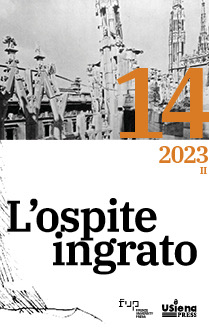Published 2023-12-22
Keywords
- debris,
- WWII,
- apocalypsis,
- neo-capitalism,
- utopia
How to Cite
Copyright (c) 2023 Francesco Diaco

This work is licensed under a Creative Commons Attribution 4.0 International License.
Abstract
This article aims to identify the different functions of debris in Franco Fortini’s works. Wartime devastation is filtered through an apocalyptic-messianic nexus that reverses destruction into palingenesis; on the contrary, during the post-war period the remains of bombed buildings quickly disappear, walled up by reconstruction, the Cold War and the economic boom. As Fortini’s writings are more and more influenced by Bertolt Brecht, the images of slow and secret decay become an allegory of the value of poetry and the intrinsic contradictions of neo-capitalism, in the expectation of its possible, but not inevitable, fall. After recalling the philosophy of history underlying the recurrence of these motifs, I investigate the author’s interpretation of rubble in the last decades of his life, from his encouragement to the good use of ruins to the paradoxical wishes of Composita solvantur.

